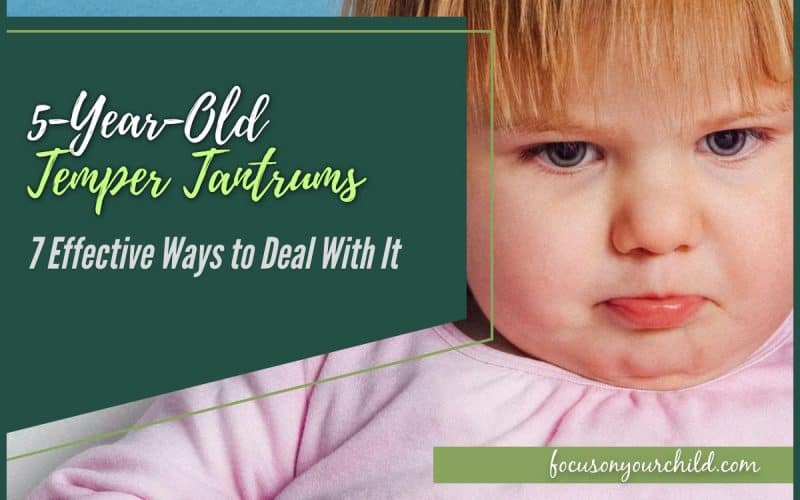Temper tantrums are a common occurrence in the lives of many parents. A lot of times, these temper tantrums are a normal part of development in the early years. There is no one-size-fits-all solution to dealing with them, but there are some tried and true tricks that will help you get through them as smoothly as possible.
Effective ways of dealing with tantrums include identifying the triggers, identifying the different types of tantrums, rewarding good behavior while ignoring bad behavior, staying calm and acknowledging their feelings, being consistent, having a plan, and knowing when to seek professional help.
This article will discuss all about 5-year-old temper tantrums and seven different ways to deal with them.
Understanding 5-Year-Old Temper Tantrums

A tantrum is a form of emotional outburst that can include crying, screaming, or other associated behaviors. These outbursts are often caused by stress and frustration.
Tantrums often occur because the child is unable to express themselves more mature ways. This can be due to many different reasons, such as not knowing how, being too young and unaware of other ways to deal with their feelings, or simply having an emotional outburst that carries on longer than usual.
It is also essential for parents to be familiar with the difference between a tantrum and a meltdown. Although they may appear the same from a glance, there is a subtle difference between the two.
A meltdown is similar to a temper tantrum but happens because the child feels like they are losing control. Meltdowns are caused by sensory overload. While the outcome is the same (e.g., crying, screaming, etc.), the root cause is different.
The distinction is important to know because tantrums are on purpose while meltdowns are not. Thus, it is crucial to deal with them differently because tantrums are not an appropriate way for them to express their feelings.
Tantrums can be tricky things for parents. However, there are many ways that you can help your 5-year-old through these tough times in an effective way so that everyone remains safe and calm throughout it all.
Effective Ways to Deal with 5-Year-Old Temper Tantrums
-
Identify the Triggers

The first step to helping your 5-year-old through these difficult times is understanding what causes them. Of course, these tantrums may be caused by different things depending on the specific situation. However, these are some common triggers that you can watch out for.
These triggers include:
- Hunger or being too full from a meal
- Being overstimulated
- Not getting what they want right away or not understanding why they can’t have it
If you know the triggers of your 5-year-old’s tantrum behaviors, then you will be able to help them avoid these situations as much as possible (e.g., by feeding them before going out on an activity). By doing this, you are helping prevent their next potential outburst from occurring again in the future.
Identifying these triggers is important because parents soon recognize that their child has particular needs, even if those children aren’t verbalizing such feelings through words yet. Parents just need to listen for clues and react accordingly, so their children don’t feel out of control.
Also, even if your child is verbalizing their feelings to you, it can still be helpful to identify the triggers because then you will know what may make them upset in the future when they aren’t able to communicate their needs properly. This way, there won’t be any surprises.
Most triggers are things that parents will be able to work with, even if it is difficult. For example, by helping your child avoid overstimulation, you can help them stay calm during the following situation where they could have a tantrum.
Parents need to remember that these behaviors are not under their control and may happen whenever. It is important to understand this so that they don’t get angry or frustrated when their child has these outbursts.
Just recognize what triggers them and try to help them avoid being around those situations as much as possible (e.g., wearing sunglasses on sunny days if your child gets irritable in bright lights).
If you have already tried to help your 5-year-old avoid the triggers but they still have a tantrum, it is crucial not to get angry. It will only make them feel worse, and you do not want them to think that their feelings are wrong or bad.
Instead, try comforting your little one as best as possible so that they know everything is going to be okay.
In addition, parents can use this time of calming down with their children after an outburst as a teachable moment for what makes good behavior happen. During these times when emotions are high, it is easy for kids to pick up on how we respond and react around those situations—which means we need to make sure our responses are correct!
-
Identify the Types of Tantrums

Aside from identifying the triggers for 5-year-old temper tantrums, it will also greatly benefit parents to understand the different types of tantrums. Parents need to understand each of these types because the different tantrums are not all created equal.
These can include fatigue tantrums, attention-seeking tantrums, refusal tantrums, disruptive tantrums, and rage tantrums.
Fatigue tantrums happen when kids get tired and cannot help themselves from having an outburst. Sometimes it is because they are overstimulated or hungry, but other times it can be out of their control.
When they have a fatigue tantrum, try finding out why their little body is tired (e.g., did they get enough sleep last night?). If not, then it can be helpful for parents to come up with some sort of plan that works best for both parties when it comes to getting the rest they need (e.g., nap time in the afternoon).
Attention-seeking tantrums happen when children only want mommy and daddy’s love and affection (e.g., not wanting to do anything without them). Unfortunately for parents, if you don’t pay attention to the child, they will most likely have a tantrum.
Dealing with attention-seeking tantrums can be a little trickier. However, it can help parents to find ways that they can give their children the attention they need without having to constantly babysit them (e.g., teach your child how to play by themselves).
Refusal tantrums happen when children refuse to do what adults tell them (e.g., eat their peas). If you don’t address the situation, then it can lead to having a potentially destructive outburst, like breaking things around the house because your little one is so upset.
Refusal tantrums can be a little more difficult for parents because there is no easy way around it when their child refuses to do what they are told. One of the best ways to deal with this type of tantrum is by giving them choices, so your child feels like they have some sort of control over the situation.
Disruptive tantrums are the most common type of tantrum, but they can still be challenging to deal with if your 5-year-old is being loud and destructive in public, making it hard for other people around you to handle. Because of this, many parents confuse disruptive behavior with rage tantrums because it can be hard to tell the difference.
When it comes to disruptive tantrums, parents can try distracting their child with a different activity so they do not get caught up in whatever is making them upset (e.g., take your kid outside and play catch).
Lastly, if your child is having a rage tantrum, try holding them and saying “you are safe” while looking at their eyes until they have calmed down. An added bonus of this method is that it also helps them feel safe and secure because they are in their parent’s arms.
Even if parents know how to deal with these types of tantrums, they still need to remember that each child will have a different temperament and react differently when things don’t go their way. Parents cannot expect all children to respond in exactly the same manner every time a situation arises.
Once parents understand the different types of tantrums that their child may have, then they can be better prepared when it happens. Parents will need to remember not to get angry at their child because this will only make things worse for their children. Instead, try using these tips to help them calm down and feel better.
Once you have learned how to deal with these different types of tantrums, your child will be so much happier.
-
Reward Good Behavior, Ignore Bad Behavior

Children need to know which kind of behavior is appreciated and which should be avoided. An easy way to get the point across is by appropriately rewarding good behavior.
For example, if your child is behaving well and following the rules, you can reward them with some sort of treat to show that what they are doing is good. This reinforces their behavior, so it doesn’t have to be something big like going out for ice cream or spending time at the park – even just giving them praise will work.
On the other hand, if your child is misbehaving, it is important to ignore them until they act appropriately. By doing this, you let your child know that their behavior is not okay and needs to improve. This can be difficult because some children will try misbehaving even more in order for parents to pay attention, but if their behavior does not get a response, then there is no point in continuing.
Parents need to know that this method will only work if they are consistent with the way they want their 5-year-old to behave.
Parents have to keep in mind that they should never give in to tantrums, especially when the tantrums are because your 5-year-old wants something. Giving in to the tantrums gives them the idea that they can get away with what they want by having a temper tantrum.
It is going to take a lot of patience, consistency, and love for parents when it comes to training their child, but the end result is going to be well worth it.
-
Stay Calm and Acknowledge Their Feelings

As parents, it can be challenging to remain calm when your child is throwing a temper tantrum. This is because the more emotional they are, the more emotional you might get in return which only makes things worse for everyone involved.
It also does not help that most children have no idea how to control their emotions either, which adds fuel to the fire. However, it is vital for parents to acknowledge their child’s emotions, whether they are happy or upset. This will help them feel understood and validated, which can go a long way when it comes to calming down during tantrums.
For example, if your child is having a rage tantrum, then you should say something like, “you must be very angry right now, and it is okay to feel that way.” Besides the fact that this helps your child calm down, it also teaches them how to cope with their feelings.
Another thing you can do if they have a mood swing is to acknowledge both sides of the argument (e.g., “I know you’re sad because you really wanted to go to the zoo today”). Even if your child does not calm down right away, the fact that you are understanding their emotions and giving them a voice makes it easier for them to control themselves.
Sometimes, it is just too late when kids already begin their tantrums. If this is the case for your 5-year-old, then you can simply wait the tantrum out. This can be a little bit harder to do than it sounds because you have no idea how long the tantrum will last. However, it is important to stay close to let them know you’re there.
Lastly, 5-year-old temper tantrums can happen because they need some extra reassurance from their parents (e.g., they do not feel secure or safe). If this is the case, you should try and give your 5-year-old more affection (e.g., hugs, kisses) to show them that they are loved, so it will help them feel better during those fussy moments.
It is important for parents to encourage their 5-year-olds to talk when they have calmed down. They should share their feelings and thoughts with their parents so they can understand what is going on for them, which will help improve the relationship between both parties.
One of the best things parents can do when their children have tantrums is to stay calm and acknowledge their kids’ feelings. When they feel understood and validated, it will be a lot easier for the entire family.
-
Be Consistent
When it comes to dealing with your children’s tantrums, consistency is one of the things you should prioritize because they are most likely going to continue having them if their parents do not enforce any limits or boundaries.
Setting limits and boundaries will help teach kids what they can and cannot do, which makes them feel safer in general. It also gives them the opportunity to learn valuable life skills that will benefit them in the future.
Consistency is also important because it helps parents be more assertive with their children, which means they are not going to take advantage of your niceness anymore. Unfortunately, there can be times when kids act out or throw tantrums when they feel like their parent/s are being too soft with them, leading to more serious problems.
Lastly, consistency is also important when it comes to getting through to your children because they will feel that their parent/s mean business and are not just playing around in order for them to learn the appropriate way of behaving. This means you should act on whatever decisions you and your spouse made when it comes to discipline so you can be on the same page since children always look for double standards between their parents.
-
Have a Plan

Tantrums can stress parents out a lot and, unfortunately, make some doubt themselves. However, it is important for parents to never judge themselves based on the number of tantrums their child has. All kids have tantrums. Parents should rather focus on how to respond to them.
Here are a few things parents should keep in mind when it comes to planning for 5-year-old temper tantrums:
- Remind yourself that your 5-year-old is not having a tantrum because they do not like you or want to hurt you. They just need help understanding how to behave and what is appropriate.
- Find some time to relax and de-stress during the day. This will make you feel more positive about your role as a parent, which will rub off on how you respond when they have tantrums over things like food or toys.
- Talk with your spouse about what might be causing their child’s tantrum. This will help you come up with a strategy that works best for them and your family as a whole, so everyone feels more comfortable during the tantrum.
- Never give in to their demands because this only teaches children to throw tantrums whenever they do not get what they want, which is definitely something no parent wants.
- Keep in mind that you are doing this for their own good because they will learn what is appropriate and expected behavior when they grow up, making them feel more confident about themselves. When children feel secure, it reduces the chances of them having these types of tantrums in the future.
- Embrace time-outs. Time-outs are a great way to give your children time to relax and calm down. It also gives you time to think about how best to approach the situation.
- Make sure your child’s room is a safe place for them during these tantrums by putting away anything they could use as a weapon or something that could hurt them in one way or another. You want their surroundings to be 100% supportive and comforting, so they feel secure.
- Please do not make them feel guilty for throwing tantrums because it is their way of communicating, albeit in a negative manner. It only makes the situation worse, and they will continue to have these types of episodes more frequently, which can be very draining regardless of if you are dealing with two or three temper tantrums every day.
-
Know When to Seek Professional Help

As much as we would like to believe that our children will grow out of their tantrums, this is not always the case. In fact, there can be times where they will get worse and more frequent, which means you should consider seeking professional help.
There are two things that parents need to know about when it comes to getting their child professional help.
Firstly, parents should not feel guilty about seeking professional help. This is because it can be a sign of how much you care for your child and want them to succeed in life.
Secondly, it does not mean that parents are doing a bad job or there is something wrong with their parenting skills. In fact, it usually means the opposite because you are willing to do whatever it takes so your child can be happy and healthy.
Parents should seek professional help because professionals have a better understanding of what the children might be going through, which gives them a different perspective on the situation at hand. For example, if your child is having a difficult time coping with their emotions, then this will be easier for the therapist to understand and deal with compared to you.
Also, if your child has an underlying mental health issue such as ADHD or autism spectrum disorder (ASD), it would be best to get them diagnosed sooner rather than later to begin working on strategies to help them cope with their condition.
Lastly, parents should get professional help if they are having a difficult time dealing with 5-year-old temper tantrums on a day-to-day basis. There is nothing wrong with asking for some assistance, especially when you know it will benefit your child in the long run because of how much they love them.
